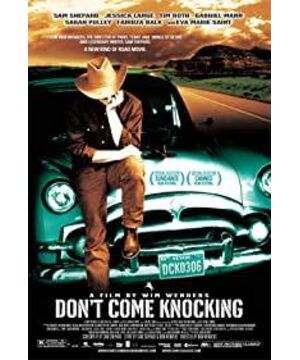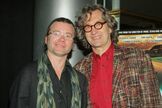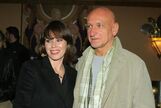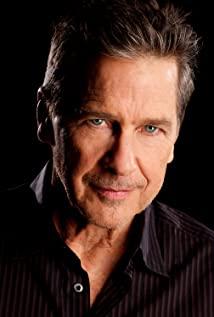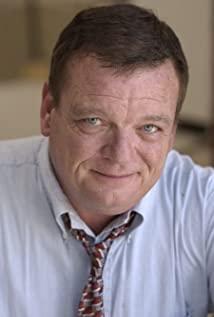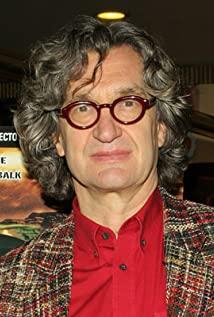Two, the man-hunt, as the prime activity suited for the landscape of the American West. From Ford's "Searchers", to Sergio Leone's spaghetti westerns, to ironic spins on the motif, Coens' "Raising Arizona" and Lynch's "Wild at Heart", the manhunt is getting as tired as the horses that labor underneath the gallant mission. In fact, the idea gets so old, that using it by an arthous film director sounds almost bold.
Three, the great American myth, the reconciliation between Father and Son, from alienation and anger (mutual), to peace and--- resignation. I talked about this in other reviews so I'll let it drop. Suffice it to say that, by this point, breathless under three mountainous cliches , I need some serious visual action to get me excited.
And visual is what we get. Wenders's own still photography, on exhibition in Shanghai two years ago, strongly echoes the paintings of Edward Hopper, but he has never been so passionately open about his adoration of the great painter: the surreal juxtaposition of bright light and pitchy shade, the color contrast that almost always involves blue, and the so, so curious feeling of characters found in a "suspended existence"; suspended, that is, in time ans space. Wenders has the same practised eyes for the total darkness that is right next to blinding sunlight, and the interesting possibilities with a lone light-bulb at the windy, late-night street corner, or how to make the rails look forlorn after the resounding and trembling under a passing train. Howard's evening by the bonfire,with a cargo truck roars across the overpass bridge near by, provides hwo a quick, dynamic tribute to a still painter can be done.
No wonder, for Wenders is such a very visual person. The Rio Grande bus station has to be fitted with a beautiful hall whose misty air is penetrated by slanty shafts of light, which reminds one of the renowned photo of NY City's Central Station in 1920s ; and the bench at the station has to be of a beautful, calm stoutness. Obsessively visual, this German is. Quirky, too. Like the digression between Jessica Lange and Tim Roth on "three kinds of potatoes, served with eggs" (home fries, hash brown, and red spuds, complete with a figurative description). Or, remember the scene the guy Howard sess through the bus window, emerging out of no where, in full grey-suited golfer's paraphalia and singing, "God's in the kitchen, God's on the wall?", while the soundtrack bursts into dissonance? You wonder,what is THAT for? Then you realize Wenders is just having fun with his Great West fetish, and his broader fascination with American Grotesquerie, like the 3rd-rate casino mirrored in the pool of water in its vast, empty parking lot. But his take on American landscape is neither cloy nor "raw", but achieves a strangely pristine quality that I don't see anywhere else: austere, but not drab (as in David Mamet); nostalgic, but not sentimental (as in Sergio Leone).but not drab (as in David Mamet); nostalgic, but not sentimental (as in Sergio Leone).but not drab (as in David Mamet); nostalgic, but not sentimental (as in Sergio Leone).
At his worst, Wenders is merely picturesque, not lyrical. Sadly here it is. That's why all the tricks in the bag, including the Hopper-ish town, the excellent compostions, frame after frame, and cinematographic gimmicks like the restless circular panning around the couch in the street corner where Howard finds peace, come to a unity that doesn't quite add up to the lyrical beauty that we expect from the better of Wenders's movies.
Oh, the acting: if you are a Jessica Lange fan, stay home with "Blue Sky" and "Postman Always Rings Twice", for she fails the plausibility test here. Lange, usually a great actress, here looks totally staged and cannot do anything spontaneous, while the actor who plays her son seems like a young Hun who just falls off a pony, full of excessive drama and over-reaction. Wenders films always demand a bit of make-believe, but this one turns make-believe to Hollywood triteness.
I remember the final shot of this movie, obviously chosen for the visual pun on the road sign: "Divide-1; Wisdom-52". Indeed. I hope the promised one full year for Wenders will give something wiser. In the mean time , I can't bring myself to give low mark to a movie so faithfully builds a Hopper-esque town, so I would still recommend it for its stunning visuals.
View more about Don't Come Knocking reviews


